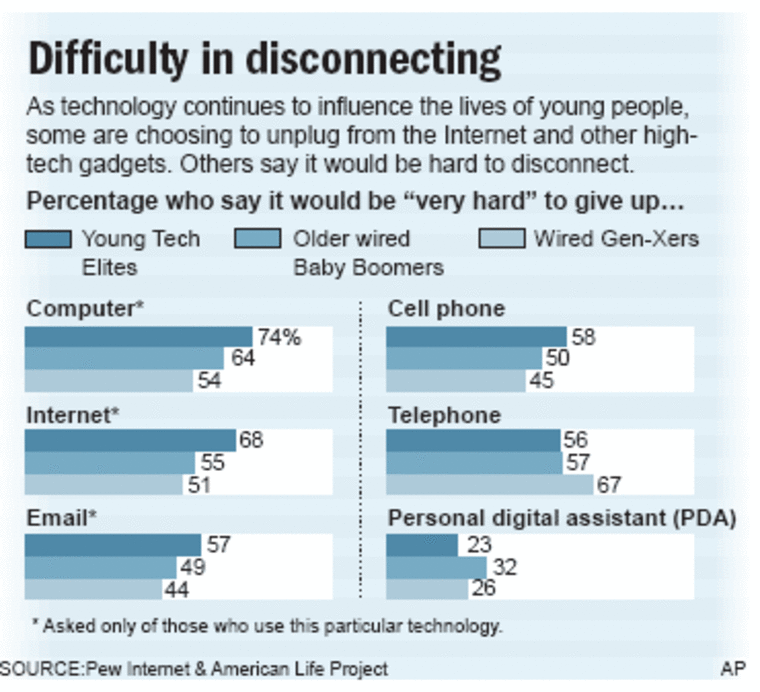Katie Achille grew up with the Internet. She was 9 when she first tapped into it -- and quickly became an avid e-mailer, Web surfer and sender of instant messages. But when recent computer troubles left her without regular Web access, something unexpected happened: To her surprise, she suddenly felt free.
"I find the break from the Internet somewhat refreshing," says Achille, now 19 and a junior at Rutgers University in New Jersey. "After spending a good portion of my freshman and sophomore years holed up here in my dorm room typing away to friends, I feel like I missed just sitting outside and enjoying the weather or going for a walk, just because."
As technology's influence in the lives of young people becomes ever greater, a few teens and twentysomethings are unplugging -- getting away from the Internet and other high-tech gadgets, at least for a while.
It's a backlash, experts say, to being hyper-accessible by e-mail, instant message, cell phone calls and text messages. People are spending more and more time in front of a computer screen or futzing with technological devices. Sometimes, they just need a timeout.
"It's like being lost in space. You get lost in the world of the Internet, games or multiple instant-message chats," says Michelle Weil, co-author of "TechnoStress: Coping with Technology @ Work @ Home @ Play."
She and fellow psychologist Larry Rosen wrote the book after noticing that more people were getting stressed out or fatigued by technologies that are supposed to make life easier.
Dave Greenfield, another psychologist who specializes in high-tech issues, knows the feeling well. He regularly carries a cell phone, a pager, an MP3 player for music, a laptop and a personal digital assistant, otherwise known as a PDA -- and says that even he often feels overwhelmed.
"Until technology gets 'stupid simple,' equivalent to turning on a light or a television set, it's going to eat time and energy," Greenfield says. Too often, he says, we're wondering: "Do I have the right adapter? Or the right battery? Or cable?"
He concedes that young people are often much better at adopting new forms of technology than middle-aged people like him are. They also widely consider computers and other high-tech devices essential to their lives, evidenced in a recent survey done by Harris Interactive for the Business Software Alliance.
A third of young people surveyed said they "couldn't live without" technology, while another 50 percent said it was "important."
Still, figuring out how to juggle that technology is a work in progress, psychologists and other experts say, and the solution is often dependent on the individual.

Amanda Lenhart, a researcher who tracks young people's Web habits, tells the story of one teen she interviewed who created two screen names for instant messaging -- the second of which she shared with just a select few friends to avoid having to talk to so many people.
"She felt she was too in demand," says Lenhart, who's with the Pew Internet & American Life Project. "There are some people who love being in the mix -- and others who are saying 'Agh, it's too much! I don't want to be part of the mix.'"
Ultimately, many people are finding that they click with some forms of technology more than others.
Achille, the Rutgers student, prefers phone calls over having to type to communicate. Once or twice a week, she uses her cell phone to call friends back home in Holmdel, N.J. -- or, occasionally, sends them a funny text message.
"But that's where it ends," she says.
Mac McNeer, a 27-year-old Chicagoan, can't stand text messages, especially the ads his cell phone company sends him. He also dislikes the idea of having to work out which keys on his cell phone go with which letters.
"Why would you take several minutes to punch in a message that would take 10 seconds to leave on someone's voice mail?" asks McNeer, who keeps his text message address a secret from friends and "tries to ignore" the ones who still manage to send them.
Meanwhile, Cobey Dietrich, a 23-year-old who works at York College of Pennsylvania, says she'd much rather talk face to face whenever possible.
She uses the Internet at work for all day, but rarely at home.
"If I'm getting good news from someone, I'd rather hear it in person so I could be there to be excited for them and give them a hug. Or if they're upset or hurting, then you can comfort them," she says.
At the very least, Dietrich would rather receive a call on her cell phone. But sometimes, she even turns that off -- a move that causes friends and relatives to complain: "Why do you have a cell phone if you don't have it on?"
Indeed, having the ability to stay in constant contact makes some people feel obligated to be plugged in 24/7.
"There's a message that setting boundaries isn't right -- an expectation that we shouldn't set those boundaries," says Allan Stegeman, a professor of communications at Drexel University in Philadelphia.
Greenfield notes that some people also feel pressure to keep up with the latest technology, whether they need it or not.
"It points to a larger theme in our culture -- that new things are good and better, and that more is better, and faster is better. And that's not always the case," says Greenfield, who wrote the book "Virtual Addiction," which looks at the adverse effects of spending too much time online.
Greenfield recalls a recent fall trip with his 10-year-old son to a YMCA camp, where they were doing trail maintenance with a group of adults and other kids -- no TVs, computers or even hand-held video games.
"These kids had no technology with them," he says. "And they were as thoroughly entertained and alive as I've ever seen them."
Weil agrees that taking a break from high-tech gadgets is vital -- a point she often addresses on the public speaking circuit. The key, she says, is using technology to enhance life -- and taking a step back when it doesn't.
"You need to have it," Weil says, "rather than it having you."
